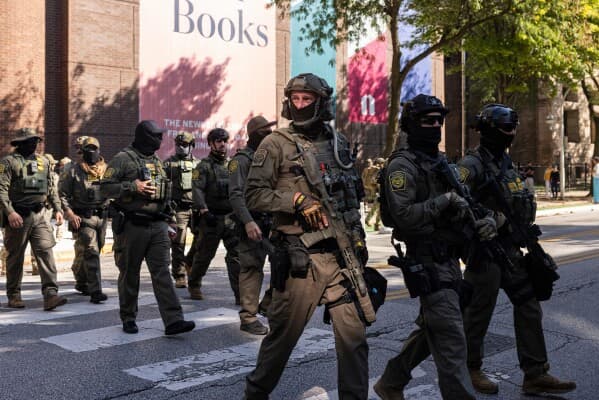We're loading the full news article for you. This includes the article content, images, author information, and related articles.
Hundreds of Texas National Guard troops have arrived in Illinois to support a federal immigration crackdown in Chicago, sparking a legal and political standoff with state and city officials who accuse the Trump administration of an "authoritarian march."

Hundreds of National Guard troops from Texas have been deployed to an army training centre outside Chicago, Illinois, to bolster the US President Donald Trump's immigration enforcement efforts. This deployment, confirmed on Tuesday, October 7, 2025, comes amidst strong opposition from local and state officials.
Illinois Governor JB Pritzker has vehemently condemned the move, characterising it as an "authoritarian march" and "Trump's Invasion." Governor Pritzker and Chicago Mayor Brandon Johnson have initiated legal action to block the deployment, arguing it is an unlawful and unconstitutional federal overreach.
President Trump has repeatedly targeted Democratic-led cities, including Chicago, for expanded federal immigration enforcement, labelling them as "war zones." This current deployment follows a ramping up of immigration enforcement in Chicago over recent weeks, which has included large-scale raids by Immigration and Customs Enforcement (ICE) agents and protests that have, in some instances, escalated to violent altercations.
The Trump administration's strategy echoes a vision laid out during his campaign, where he proposed using multiple levels of authority for mass deportations. Similar deployments of National Guard troops have occurred in other US cities like Los Angeles and Washington D.C., and attempts were made in Portland, Oregon, though a federal judge blocked the deployment there.
The deployment of National Guard troops for domestic law enforcement raises significant legal and constitutional questions. While governors can call on Guard members for temporary law enforcement, federal law generally prohibits the President from using the military in this role under normal circumstances, as per the Posse Comitatus Act.
However, presidents can circumvent this by invoking the Insurrection Act. The Texas National Guard, which has an agreement with ICE, has limited authority to enforce immigration laws during regular duties. Chicago Mayor Brandon Johnson has signed an executive order prohibiting ICE agents from operating on city-owned properties, creating "ICE-free zones" within the city.
Governor Pritzker stated that federal officials had not directly communicated or coordinated the deployment with the state. He accused the Trump administration of "inciting violence" to justify military intervention and warned that such actions threaten civil rights, with agents allegedly pulling people from their homes and demanding proof of citizenship based on their appearance.
Mayor Johnson emphasised that Chicago would not allow federal agents to "rampage throughout our city with no checks or balances." President Trump, in response, called for Governor Pritzker and Mayor Johnson to be jailed for allegedly failing to protect ICE officers.
The deployment risks escalating tensions between federal and local authorities and could lead to further civil unrest. The use of military personnel in civilian law enforcement roles, particularly against the wishes of state leadership, sets a precedent that critics argue undermines democratic principles and state sovereignty.
For Kenyans in the US, particularly those without legal documentation, the intensified crackdown poses a significant threat of deportation. This situation mirrors past immigration crackdowns in Kenya, which have drawn criticism from human rights organisations like Amnesty International for risking xenophobia and arbitrary detentions.
The exact scope of activities for the deployed National Guard troops remains a point of contention, with Illinois officials stating they have received no communication from the federal government regarding troop movements or directives. The legal battle over the deployment's constitutionality is ongoing, with a federal judge yet to issue a final ruling on the requested restraining order.
The outcome of the federal court's ruling on Thursday, October 9, 2025, will be crucial in determining the immediate future of the National Guard deployment in Illinois. Further legal challenges and political confrontations between the Trump administration and Democratic-led states are anticipated. The situation also highlights the broader debate on immigration policy and the balance of power between federal and state governments in the United States.
Kenya has experienced its own immigration crackdowns, with past directives leading to widespread arrests and deportations of undocumented migrants. In 2018, Amnesty International urged Kenya to halt a crackdown on undocumented workers, citing risks of xenophobia and human rights violations. More recently, in July 2025, the Kenyan National Police Service intensified its crackdown on illegal immigrants, calling on citizens to report undocumented individuals.
Keep the conversation in one place—threads here stay linked to the story and in the forums.
Sign in to start a discussion
Start a conversation about this story and keep it linked here.
Other hot threads
E-sports and Gaming Community in Kenya
Active 9 months ago
The Role of Technology in Modern Agriculture (AgriTech)
Active 9 months ago
Popular Recreational Activities Across Counties
Active 9 months ago
Investing in Youth Sports Development Programs
Active 9 months ago